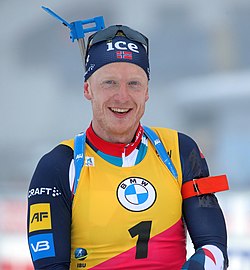| 2022 Winter Olympics medals | |
|---|---|
 Johannes Thingnes Bø (pictured) tied with Quentin Fillon Maillet, Marte Olsbu Røiseland, and Alexander Bolshunov for most overall medals won at the 2022 Winter Olympics at five apiece. Bø led the gold medal count with four. | |
| Location | Beijing, |
| Highlights | |
| Most gold medals | |
| Most total medals | |
| Medalling NOCs | 29 |

Legend:
represents countries that won at least one gold medal.
represents countries that won at least one silver medal but no gold medals.
represents countries that won only at least one bronze medal.
represents countries that did not win any medals.
The 2022 Winter Olympics, officially known as the XXIV Olympic Winter Games, were a winter multi-sport event held in Beijing, China, from 4 to 20 February. A total of 2,871 athletes from 91 nations participated in 109 events in seven sports across 15 disciplines. [1] [2]
Contents
Overall 29 nations received at least one medal, and 23 of them won at least one gold medal. Athletes from Norway won the most medals overall, with 37, and the most gold medals, with 16. The latter record was the highest gold medal tally at a single Winter Games. [3] Host nation China won nine gold medals surpassing its gold medal tally of five during the 2010 winter edition. [4] Athletes from that nation also won 15 medals overall, which eclipsed its record of 11 at both the 2006 and 2010 winter editions. [5]
Biathletes Johannes Thingnes Bø, Quentin Fillon Maillet, and Marte Olsbu Røiseland, and cross-country skier Alexander Bolshunov won the most total medals at the games with five each. [6] Bø also earned the most gold medals with four. [7] Snowboarder Zoi Sadowski-Synnott of New Zealand won the first Winter Olympic gold medal for that nation. [8] Germany achieved a podium sweep in the men's two-man bobsleigh competition with Francesco Friedrich and Thorsten Margis winning gold, Johannes Lochner and Florian Bauer earning silver, and Christoph Hafer and Matthias Sommer attaining bronze. [9]